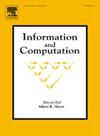排他性不确定性有限自动机的复杂性
IF 1
4区 计算机科学
Q3 COMPUTER SCIENCE, THEORY & METHODS
引用次数: 0
摘要
排他性非确定性有限自动机(XNFA)是具有排他性或类似接受条件的非确定性有限自动机。如果输入的计算树中只有一条可接受的路径,则该输入被接受。如果没有或有多个接受路径,则拒绝输入。事实证明,从描述复杂性的角度来看,xnfa与已知类型的有限自动机有很大不同。其中,DFA模拟XNFA的状态代价为3n−2n+1个状态,而NFA模拟XNFA的状态代价为n·2n−1个状态。这两个边界也被证明是紧的。另一方面,与xnfa相比,nfa可能具有优势。对于用XNFA模拟NFA,给出了2n−1态的紧界。最后,我们研究了xnfa不同决策问题的计算复杂度,证明了空性、普适性、包含性和等价性是pspace完全的。本文章由计算机程序翻译,如有差异,请以英文原文为准。
Complexity of exclusive nondeterministic finite automata
Exclusive nondeterministic finite automata (XNFA) are nondeterministic finite automata with an exclusive-or-like acceptance condition. An input is accepted if there is exactly one accepting path in its computation tree. If there are none or more than one accepting paths, the input is rejected. It turns out that, from a descriptional complexity point of view, XNFAs differ significantly from the known types of finite automata. In particular the state costs for the simulation of an XNFA by a DFA are states, while the costs for simulating an XNFA by an NFA are states. Both bounds are also shown to be tight. On the other hand, NFAs may have advantages in comparison to XNFAs. For the simulation of an NFA by an XNFA, a tight bound of states is given. Finally, we investigate the computational complexity of different decision problems for XNFAs and it turns out that emptiness, universality, inclusion, and equivalence are PSPACE-complete.
求助全文
通过发布文献求助,成功后即可免费获取论文全文。
去求助
来源期刊

Information and Computation
工程技术-计算机:理论方法
CiteScore
2.30
自引率
0.00%
发文量
119
审稿时长
140 days
期刊介绍:
Information and Computation welcomes original papers in all areas of theoretical computer science and computational applications of information theory. Survey articles of exceptional quality will also be considered. Particularly welcome are papers contributing new results in active theoretical areas such as
-Biological computation and computational biology-
Computational complexity-
Computer theorem-proving-
Concurrency and distributed process theory-
Cryptographic theory-
Data base theory-
Decision problems in logic-
Design and analysis of algorithms-
Discrete optimization and mathematical programming-
Inductive inference and learning theory-
Logic & constraint programming-
Program verification & model checking-
Probabilistic & Quantum computation-
Semantics of programming languages-
Symbolic computation, lambda calculus, and rewriting systems-
Types and typechecking
 求助内容:
求助内容: 应助结果提醒方式:
应助结果提醒方式:


